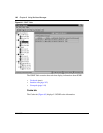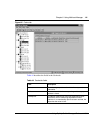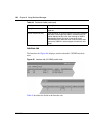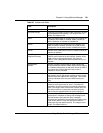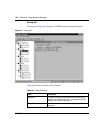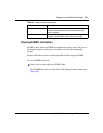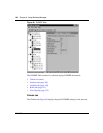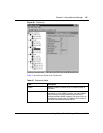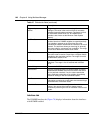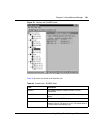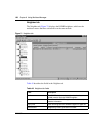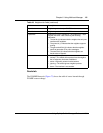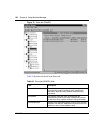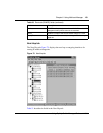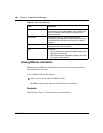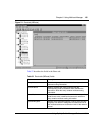
148 Chapter 6 Using Multicast Manager
208963-B
Interface tab
The DVMRP Interface tab (Figure 70) displays information about the interfaces
with DVMRP enabled.
TriggeredUpdate
Interval
Triggered updates are sent when routing information
changes. This value is the amount of time (in seconds)
between triggered update messages. The range is from 5
to 1000 with a default value of 5. In DVMRPv3, this
variable is also known as the Minimum Flash Update
Interval.
LeafTimeOut When DVMRP advertises a route on an interface, it waits a
period of time for a DVMRP neighbor to respond positively.
If no neighbor responds in the given time, the router
considers the network attached to the interface to be a leaf
network. The leaf timer shows you how long (in seconds)
the router waits for a response from a neighbor. The range
is from 25 to 4000 with a default value of 200.
NbrTimeOut The neighbor report timer specifies how long (in seconds)
the router waits to receive a report from a neighbor before
considering the connection inactive. The range is from 35
to 8000 with a default of 140.
NbrProbeInterval How often the DVMRP router sends probe messages on its
interfaces. The range is 5 to 30 seconds with a default
of 10.
VersionString The router’s DVMRP version information.
GenerationId Used by neighboring routers to detect whether a reset or
disable/enable DVMRP action has occurred to the switch
or to a particular interface. If so, the router resends the
entire multicast routing table to its neighbor immediately,
instead of waiting for the next scheduled update.
NumRoutes Number of entries in the routing table. You can use this
information to monitor the routing table size to detect illegal
advertisements of multicast routes.
ReachableRoutes Number of entries in the routing table with noninfinite
metrics. You can use this number to detect network
partitions by observing the ratio of reachable routes to total
routes.
Table 47 Globals tab fields (continued)
Field Description



